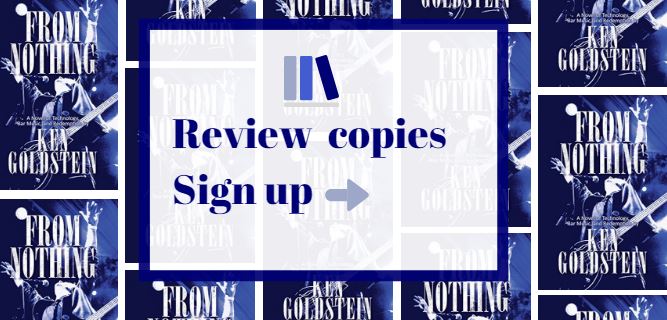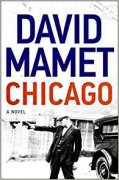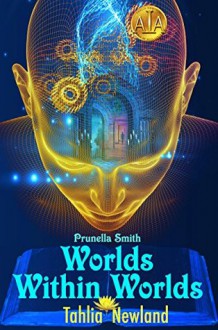
We're happy to introduce you Ken Goldstein. Author of This Is Rage, Endless Encores, and From Nothing; and entrepreneur, adviser and a chairman at ThriftBooks & Good Men Project.
Ken talked with us about his brand new business suspense novel From Nothing, writing plans and inspirations. Read our interview to get to know the author better.
For those of you who'd like to request a review copy of Ken's newest title From Nothing, please sign up. The author will send a signed paperback to five lucky bloggers. Good luck!

What are you reading now Ken?
I’m getting ready for a service project in Cape Town, South Africa, where I will be working with entrepreneurs, so I’m reading Kasinomics: African Informal Economies and the People Who Inhabit Them. It’s a fascinating portrait of storefront marketplace dynamics, common-sense marketing and the role of human connectivity in commerce. I just finished Dan Rather’s What Unites Us: Reflections on Patriotism, which I think is a must-read for all Americans given the turmoil of our times. Next up for me is David Mamet’s Chicago: A Novel of Prohibition, which I’ll probably read crossing the Atlantic.



Tell us a few words about yourself - whatever you want to share about your personal and professional life, but also how does an entrepreneur become a writer?
 The truth is, it’s the opposite: I’m a writer who became a business guy and then later returned to writing with my first novel This is Rage: A Novel of Silicon Valley and Other Madness. The first decade of my career was all about writing, including being part of some of the first real storytelling efforts in computer games. As my career evolved, I found that my business skills became more valuable to the companies where I was involved, and so I eventually stopped writing to focus on company leadership. After many years absent from my place at the keyboard, I returned to my original passion for words about eight years ago, and now I split my time between writing and advising highly creative companies.
The truth is, it’s the opposite: I’m a writer who became a business guy and then later returned to writing with my first novel This is Rage: A Novel of Silicon Valley and Other Madness. The first decade of my career was all about writing, including being part of some of the first real storytelling efforts in computer games. As my career evolved, I found that my business skills became more valuable to the companies where I was involved, and so I eventually stopped writing to focus on company leadership. After many years absent from my place at the keyboard, I returned to my original passion for words about eight years ago, and now I split my time between writing and advising highly creative companies.
Was there one event that inspired your decision to become a writer?
I think it’s like anything else: You try to do something out of curiosity, and people tell you they like your work and want more, so you feel compelled to study your craft. Reading was pretty much my whole life as a kid, and writers to me were the superheroes who delivered justice in the form of philosophical thought bombs and sometimes really clever jokes.
I wrote a few plays prior to college that seemed to catch on, and people would tell me they couldn’t wait for my next one, so I sat down and tried to do it again. I discovered that if I read and wrote every day, I would get better at it, and as I got better at it, I became obsessed with wanting to become really good at it. That’s when I discovered that writing is more process than arrival, and as such, it’s an inexhaustible channel for passion. I thought I was obsessed with the craft as a very young person. Now I’m truly obsessed, and it remains something I can do for the rest of my life and never stop learning or improving.
You’re a busy man being an adviser, entrepreneur, mentor and a leader in many of your projects. I can imagine that your life experiences helped you a lot in writing your books as all of your titles give a reader a look behind the curtain of how corporate business operates in America. Or was it on the contrary and the knowledge disturbed your fictional story to emerge?
The advice most writing teachers pound into you – write what you know – carries a lot of truth. Yet there’s a piece of advice that I think is even more profound. One of your challenges and opportunities as a writer is to take your readers to places they might not otherwise get to visit. Not a lot of people get to sit in on a corporate board meeting. Not a lot of people have daily access to captains of industry. A lot of what people think about the business world is wrong, because the people writing the stories haven’t been in the right rooms to impose a layer of authenticity on the everyday absurdities of wealth, power and the enormous struggles below the surface. When I realized I had that access as well as the ability to make it interesting to people who love fiction, I saw a unique opportunity I could pursue. Making it real and making it a good story require a reasonably unique approach to the material, and I decided I would put my all into trying to pull off that challenge.
Your third and the newest title will be released June 12th 2018. Please tell our readers more about From Nothing: A Novel of Technology, Bar Music and Redemption
It’s truly the most personal of my three novels. From Nothing is certainly born in the  business world, but it traverses to my deep love of music, and from there attempts a meditation at what in our lives matter and what we are willing to do to realize the core truth of ourselves.
business world, but it traverses to my deep love of music, and from there attempts a meditation at what in our lives matter and what we are willing to do to realize the core truth of ourselves.
It takes readers behind the scenes of the tech world, behind the scenes of the classic rock music world; but in the end it’s the life story of one man, Victor Selo, trying to make sense of the choices he has made and still needs to make to put the earliest turmoil of his life behind him. Victor wants to grow – needs to grow – but he can’t help but keep getting in his own way when faced with the extraordinary pressure of high-stakes decision-making.
No matter how many times he learns the lesson – that we discover ourselves in the creativity of beginning anew – he is torn by the traps of outward pressures and enticements. He has to learn with absolute certainty that beginning “from nothing” is not a punishment, but a gift of discovery.

Your previous book Endless Encores is a guide book on how to succeed in business. Does it correspond to the success in the publishing world as well?
There is an enormous paradox in that question. I know a lot about marketing and have been reasonably successful at it over the years, but marketing yourself as a writer is a much trickier proposition. I can work with a team of professionals to build an omniscient value proposition in a product line and fund its success by measuring the analytics in various tactical investments, but my sense is that in storytelling, people need to find the voices that move them much more organically, through friendship and word of mouth.
 All of the basic principles in Endless Encores: Repeating Success Through People, Products, and Profits apply, but the core proposition of Endless Encores is that there is no success without failure; succumbing to copy a previous success is the plight of the one-hit wonder, and no one gets to predict their successes and failures. Add the notion of art to that premise and you enter a realm where success is almost exclusively in the control of the audience.
All of the basic principles in Endless Encores: Repeating Success Through People, Products, and Profits apply, but the core proposition of Endless Encores is that there is no success without failure; succumbing to copy a previous success is the plight of the one-hit wonder, and no one gets to predict their successes and failures. Add the notion of art to that premise and you enter a realm where success is almost exclusively in the control of the audience.
What are your writing plans? Do you actually have any at this point, right before the release of your third book, or will you start making plans once it's out?
I find that the last phase of writing a book, final editing and proofing, is less arduous on the creative mind than the earlier phases of composition and revision, which for me has meant a time of hunger for innovation. Over the last year, I have put that energy to work on a new novel, become increasingly focused on developing the story, characters and thematic elements I want to explore. That early work is now on the shelf fermenting into the wine hopefully it will someday become. I know what the next book is about; I just don’t know the timetable for delivering it or all the side paths that will intersect the arc.
All of your fiction books are business suspense fiction. Do you consider changing the genre or will you follow the writing path?
I’m not sure. My next book is definitely in the business suspense fiction genre. I think my voice is strong there and as yet not exhausted. Might I kick myself out of my comfort zone and try something else? I’m not ruling it out. There are lots of things I’d like to write about, but only a few I feel I know well enough to deliver on authenticity.
Whatever I write, I just want to be certain there is more to the story and characters than the material on the surface. I want to encourage people to think about the issues and circumstances of these characters’ lives as they apply to the complexity of the world around us. That’s my keen interest: driving a dialogue of comparable situations that might cause readers to rethink some of their most pressing personal decisions as their lives intersect with others.
Please tell us about your day and your writing habits. Do you write every day, and for how long? And how do you combine your “day job” with writing?
I get asked this a lot and I have to admit I am the absolute worst person to ask. I have tried everything imaginable to create a discipline in my life around my writing time and my not-writing time. Nothing works for me. I usually have to force myself to focus on tuning out everything that is not writing in order to write. Because I have a number of business interests, I have a smorgasbord of opportunities to procrastinate on silent time at the keyboard. Then the muse will sing, the mood will hit me and I’ll knock out 4,000 words. The next day I may cough up a sentence, the next day I may edit the four thousand words. If I were better at this, I could tell you when a book will be done, but I am just awful at it and I don’t seem to get any better.
Who are your favorite authors and genres? Have they influenced you and in what way?
I have written at length about Tom Wolfe, who recently passed away. His work (both non-fiction and fiction) taught me what a story should be. The entire notion of New Journalism and the social novel were to me a call to emerging voices to write about stuff that matters. There’s a glass-encased picture of Shakespeare on my desk because if you want to learn how dialogue and poetry create voice in epic storytelling, the Bard is the high-water mark. I love everything that Anne Lamott writes because she embodies the notion of heart. Kurt Andersen is perpetually brilliant, particularly at weaving irony into the complex human problems we all face. Many forms of thoughtful humor built from observation resonate for me, and rounding out the list would be Mark Twain (honesty), Charles Dickens (serialization), Samuel Beckett (isolation), Lenny Bruce (courage) and George Carlin (originality). I also seem to read almost everything written about The Beatles and the sport of professional baseball, looking for clues in both for the perfection of craft.
If you, or any of your readers would like to learn any more about me please feel free to visit my site: http://kengoldsteinauthor.com/.
Ken Goldstein books on BookLikes:
(click the book covers to add to your bookshelf)





 Log in with Facebook
Log in with Facebook 



















